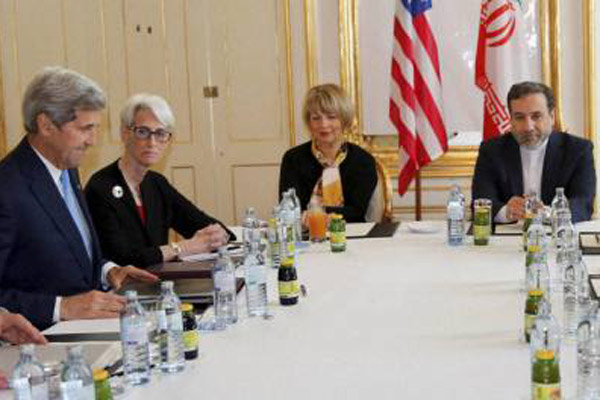
Iran rejects nuclear curbs beyond 10 years
TEHRAN, July 22, 2015
Iran will not accept any extension of sanctions beyond 10 years, an official said on Wednesday, in the latest attempt by its pragmatist government to sell a nuclear deal with world powers to skeptical hardliners.
Abbas Araqchi, one of several deputy foreign ministers, also told a news conference Iran would do 'anything' to help allies in the Middle East, underlining Tehran's message that despite the deal Iran will not change its anti-Western foreign policy.
Ayatollah Ali Khamenei, the highest authority in Iran, told supporters on Saturday that US policies in the region were "180 degrees" opposed to Iran's, in a Tehran speech punctuated by chants of "Death to America" and "Death to Israel".
Under the accord, Iran will be subjected to long-term curbs on its nuclear work in return for the lifting of US, European Union and UN sanctions.
The deal, signed by the US, Britain, China, France, Germany, Russia and the EU, was a major success for both US President Barack Obama and Iran's pragmatic President Hassan Rouhani.
But both leaders have to promote it at home to influential hardliners in countries that have been enemies for decades.
Araqchi, Iran's senior nuclear negotiator, told the televised conference that any attempt to re-impose sanctions after they expired in 10 years would breach the deal.
He was referring to a resolution endorsing the deal passed by the UN Security Council on Monday.
The resolution allows all UN sanctions to be re-imposed if Iran violates the agreement in the next 10 years. If Iran adheres to the terms of the agreement, all the provisions and measures of the UN resolution would end in 10 years.
However, the six world powers, known as the P5+1, and the European Union told UN Secretary-General Ban Ki-moon earlier this month that after 10 years they planned to seek a five-year extension of the mechanism allowing sanctions to be re-imposed.
Araqchi challenged this move, saying: "Our priority is our national interests, not UN Security Council's resolutions."
"The UN Security Council’s resolution says clearly that the timeframe of agreement is 10 years, and Iran’s case will be closed in the Security Council after that," Araqchi said.
"If the US and any other member of P5+1 say they want to adopt a new resolution after 10 years allowing sanctions to be re-imposed, it is the breach of Vienna agreement and has no credibility."
Iran's foreign ministry said shortly after the passage of the resolution on Monday that the nuclear deal did not mean Tehran accepted "sanctions and restrictions imposed by the UNSC, the US, the EU or member countries."
On Monday, Araqchi told national television: "Whenever it's needed to send arms to our allies in the region, we will do so. We are not ashamed of it."
US allies in the Gulf have cautiously welcomed the July 14 deal, but they accuse Tehran of interfering in Arab conflicts, such as Syria,and pushing hard for heightened regional influence.
US Secretary of State John Kerry said in remarks published on Wednesday he will seek to reassure Gulf officials at a meeting in Qatar in the next two weeks that Washington will work with them to push back against Iranian influence in the region.
"We have negotiated a nuclear deal for the simple reason that we believe if you are going to push back against Iran, it's better to push back against an Iran without a nuclear weapon than with one," the pan-Arab newspaper Al Sharq Al Awsat quoted Kerry as saying.-Reuters







